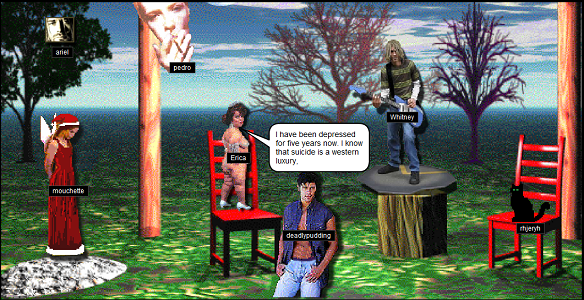Confessional Poetry
“To Be or Not to Be Mouchette”
An article in I ? E-Poetry
This work combines selections from entries by people who participated in Neddam’s interactive Mouchette website and places them in conversation by assigning them to moveable avatars and scheduling their presentation. Neddam’s character and online persona, Mouchette, is inspired by the protagonist of a 1967 Bresson film of the same name, in which a much-abused teenage girl resorts to suicide at the end of the film. The site’s aesthetics, theme, and protection of anonymity have inspired many people to open up and discuss their suicidal tendencies, experiences, and offer advice, forming a support community that may have saved many lives and spared others from unnecessary suffering.
This work’s title echoes Hamlet’s famous soliloquy in which he considers ending his own life, an idea reinforced by the use of images of celebrities who committed suicide, such as Marilyn Monroe and Kurt Cobain. The use of avatars (most of which face the reader) on a two-dimensional space is evocative of a dramatic stage in which these characters are presenting a series of soliloquies. This metaphorical space is representative of the site itself, a networked location in which people can share their deepest and darkest secrets, their typed voices entering a conversation while being physically all alone.
As you read the texts in the speech balloons and move avatars around the screen space, remember that this is not meant to be seen as a literal stage, which would violate the logic of the soliloquy (as much as attempting to pluralize “Lone Ranger”). This is partly cyberdrama, but more a combination of dramatic monologue and confessional poetry, in which someone’s intimate thoughts are given a voice through an avatar— a visualization of a character.
The Confessional poets in the 1950s and ’60s focused their poetry on the inward gaze through a highly stylized, formalized discourse reminiscent of Modernism. The Post-Confessional poets in the 1970s and ’80s largely abandoned such distancing effects, offering a raw, direct, even explicit account of intensely personal material in their poetry. This work suggests the potential for an even less self-measured confessional mode of expression— Post-Post-Confessional writing, if you will— made possible by the potential for anonymity and publication immediacy of the Web.
Perhaps this is a sign of the times.
Note: Read the ELMCIP Knowledge Base entry for this work.

